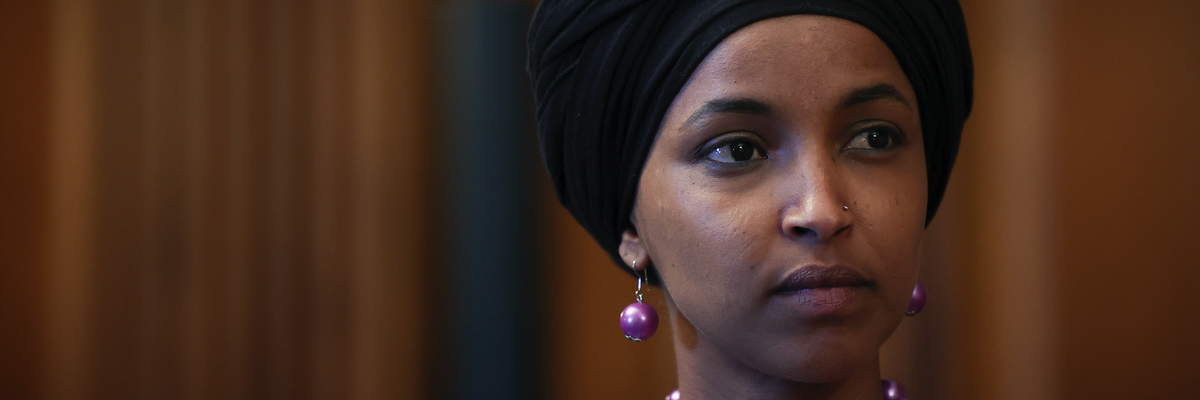Congresswoman Ilhan Omar on Friday marked the upcoming 20th anniversary of the George W. Bush administration's invasion of Iraq—where thousands of U.S. troops remain today—by asking if Americans have learned anything from the "failed war of aggression" and warning that waging another such war will have even more dire consequences.
In a Twitter thread, Omar (D-Minn.) asserted that "20 years later, the Iraq War remains the biggest foreign policy disaster of our generation, one that took thousands of American lives and hundreds of thousands of Iraqi lives."
As Common Dreams reported Wednesday, the Costs of War Project at Brown University's Watson Institute for International and Public Affairs estimates as many as 580,000 people were killed in Iraq and Syria since 2003 and nearly 15 million people were made refugees or internally displaced by the war—which is forecast to cost a staggering $2.9 trillion by 2050.
The war was waged—under false pretenses against a country that had nothing to do with the September 11 attacks—by neoconservative Republicans in the Bush administration who since before 9/11 had sought a way to invade Iraq and oust erstwhile ally Saddam Hussein. The horrors of war and occupation included torture, indiscriminate killing, sex crimes, environmental devastation, and soaring birth defects caused by the use of depleted uranium weapons.
What then-White House Press Secretary Ari Fleischer called Operation Iraqi Liberation—OIL—devastated much of Iraq but enriched multinational corporations while creating a power vacuum that was eventually filled by Islamic State, whose rise to power in much of Iraq and neighboring Syria led to a second phase of the war launched during the administration of former President Barack Obama that continues today.
"Have we fully learned the lessons from this failed war of aggression, or are we doomed to repeat it?" Omar asked.
"Our foreign policy discourse remains fundamentally pro-war," Omar noted. "Think tanks (often the same ones who cheerled the Iraq War) outflank each other to justify armed conflict and derail diplomacy with adversaries like Iran."
Omar—whom Republicans recently ousted from the House Committee on Foreign Affairs—continued:
Instead of seeing China as a geopolitical challenge to be managed, politicians gin up jingoistic sentiment and nationalism to see who can be the most "anti-China."
Our spending on Pentagon waste and new weapons continues to rise uncontrollably—with weapons contractors wielding more lobbying power than ever in Washington.
Our national media too often treat war as a game—a way to juice ratings as fewer Americans turn into TV news—rather than the most horrific state of conditions to be avoided at all costs.
Claims from senior national security officials are reported as fact, even when no evidence for those claims is presented.
Much like the lost Iraqi lives lost were often ignored 20 years ago, we continue to ignore the pain and suffering of Black and Brown people in places like Syria, Yemen, Ethiopia, Myanmar, Haiti, and more.
"To truly be able to avoid another Iraq, we need a national reckoning with how we got into it the first place," argued Omar, who fled civil war in Somalia with her family when she was a child.
"We need accountability for those who got us into this war," Omar said. "But most of all we need to see all of our lives connected as part of the human fabric—to understand that the parent who loses a child in war could be us, that the child who is displaced could be our child."
"Because the next Iraq," she added, "will be even worse."
